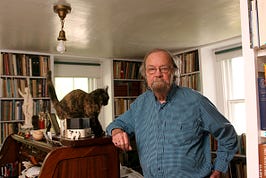|
 |
The Writer's Almanac from Wednesday, September 20, 2017
“The Singing” by Patrick Phillips from Elegy for a Broken Machine. © Knopf, 2017.
ORIGINAL TEXT AND AUDIO - 2017
Today is the birthday of American poet and essayist Donald Hall, born in Hamden, Connecticut (1928), who once said, “Every good poet in the world has written only a few terrific poems.”
When he was 89, he no longer wrote poetry. “Not enough testosterone,” he said. Instead, he turned to prose: his last book is a collection called Essays After Eighty (2014). Starting the book was simple. He said, “One day I looked out the window and began writing about being an old man looking out the window at the year going by.”
Hall was educated at Exeter, where he played softball with visiting poet Robert Frost, whom Hall remembers as “a spoiled brat,” even though Frost was 79 years old at the time. It was at Exeter that Donald Hall decided to become a writer. He’d been enamored of horror movies as a kid, which led him to reading Edgar Allan Poe, and trying to write like Poe, but at 14, he befriended some Yale students who kept mentioning a poet named T.S. Eliot. He says: “I saved up my allowance and bought the little blue, cloth-covered collected Eliot for two dollars and fifty cents and I was off. I decided that I would be a poet for the rest of my life and started by working at poems for an hour or two every day after school. I never stopped.”
Donald Hall’s books of poetry include Exiles and Marriages (1955), The Yellow Room (1971), Kicking the Leaves (1978), The One Day (1988), and Old and New Poems (1990). He’s a former U.S. poet laureate.
Today is the birthday of Maxwell Perkins, the most famous American editor. He discovered F. Scott Fitzgerald, Ernest Hemingway, and Thomas Wolfe. His fellow editors at Scribner wanted to sign more experienced writers thinking they were a sure thing, but Perkins looked for new talent, and he struck gold.
Perkins became the model for a new kind of editor. He did much more than clean up a book for publication; he looked for a writer he believed in who still had a lot of work to do, and then nurtured the book until it reached its final form. He suggested changes to the plot, he came up with book titles, and was a friend to the writers he published.
Perkins was not good at spelling and punctuation, and he was a very slow reader. His gift lay in spotting talent, particularly in writers who didn’t have reputations yet. He was also talented at getting those writers to respond to criticism of their work. He said that Fitzgerald was very sensitive to criticism, that “he could accept it, but as his editor you had to be sure of everything you suggested.” Hemingway was a perfectionist, and claimed to have written parts of A Farewell to Arms over 50 times. Perkins said, “Before an author destroys the natural qualities of his writing — that’s when an editor has to step in. But not a moment sooner.”
But his biggest challenge by far was Thomas Wolfe, who was a chronic over-writer who struggled to delete a page. Wolfe would write his novel Of Time and the River (1935) standing up, using the top of a refrigerator as a desk (he was 6’6’’), and then he would throw each page into a box without editing or looking at it. Perkins had to go through the mess of papers and put the pages in order, based on his best guess. Over time, they became estranged. In 2016, the movie Genius came out dramatizing their relationship, with Colin Firth as Perkins and Jude Law as Thomas Wolfe.
Later in his career, he also published Marjorie Kinnan Rawlings’ The Yearling and Alan Paton’s Cry, the Beloved Country. Despite his huge success, he was a modest, idiosyncratic character who liked to stay out of the limelight. The way he thought about editing contrasts with how people thought of him. He was famous for having discovered so many important writers, but he thought editors shouldn’t draw attention to themselves for the work they did on other people’s books. He said: “An editor does not add to a book. At best he serves as a handmaiden to an author. […] An editor at most releases energy. He creates nothing.”
Today is the birthday of English poet and novelist Stevie Smith, born in East Yorkshire, England (1902). Smith’s birth name was Florence Margaret, and her family called her “Peggy,” but when she was a young woman, a friend said she reminded him of the jockey Steve Donoghue, and she was “Stevie” after that.
For most of her life, Smith worked as a secretary in a British publishing house and lived with her aunt, all the while writing and publishing acerbic, witty poems and novels, like Novel on Yellow Paper (1936), narrated by a chatty and sharp young woman named Pompey, who was basically a stand-in for Smith. At one point, Pompey says: “But first, Reader, I will give you a word of warning. This is a foot-off-the-ground novel that came by the left hand. And the thoughts come and go and sometimes they do not quite come and I do not pursue them to embarrass them with formality to pursue them into a harsh captivity. And if you are a foot-off-the-ground person I make no bones to say that is how you will write and only how you will write. And if you are a foot-on-the-ground person, this book will be for you a desert of weariness and exasperation.”
The novel took Britain by storm. No one thought an unassuming, rather dull-seeming woman like Smith could have written such a book. The poet Robert Nichols was convinced that Virginia Woolf was ‘‘Stevie Smith’’ and even wrote Woolf an odd six-page letter assuring her that Novel on Yellow Paper was her best by far. Smith loved all the notoriety, but wrote to a friend, ‘‘Very few in this suburb knew me as Stevie Smith, & I should like it to stay that way.”
Stevie Smith’s most famous poem is “Not Waving but Drowning,” which was voted Britain’s “second-favorite poem.”
In her novel Over the Frontier (1938), Smith wrote, “Power and cruelty are the strengths of our lives, and only in their weakness is there love.”
Stevie Smith died of brain tumor in 1971. She once said: “There is no reason to be sad, as some people are sad when they feel religion slipping off from them. There is no reason to be sad, it is a good thing.”
Be well, do good work, and keep in touch.®
Cheerfulness by Garrison Keillor. LINK
You’re a free subscriber to The Writer's Almanac with Garrison Keillor. Your financial support is used to maintain these newsletters, websites, and archive. Support can be made through our garrisonkeillor.com store, by check to Prairie Home Productions P.O. Box 2090, Minneapolis, MN 55402, or by clicking the SUBSCRIBE button. This financial support is not tax deductible.


